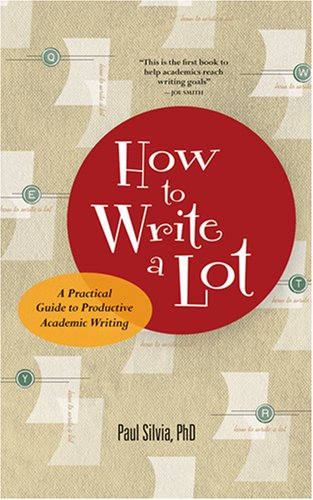For an introductory seminar on academic research, my professor assigned us to read How to Write a Lot: A Practical Guide to Productive Academic Writing by Paul Silvia. In this hard-hitting little book, Silvia sounds like a fierce training coach: if you want results, you’re just going to have to put the time and effort in. Make a writing schedule, says Silvia, and stick with it. If you wait until the muses breathe on you, or until you’ve exhausted the research on your topic, you’ll never write anything.
Paul Silvia challenged and inspired me. I don’t want to forget what I learned from him. Here are some key principles I’ve culled from his book.
1. Quit the excuses.
Many writers have a list of excuses, or “specious barriers” which Silvia demolishes. These excuses include, “I don’t have time to write,” “I need to do more research,” “I need better equipment,” or “I’m not in the right mood.” These excuses come mostly from “binge writers” (a group that Silvia consistently lambasts)–people who prefer intense bouts of frantic writing over scheduled, methodical productivity.
2. Schedule a time to write, and stick with the schedule.
Writing is hard work. It takes self-disciplined and commitment. Academic writing in particular shouldn’t depend on the coming of a certain mood. Instead of waiting for the right moment, you must make the right moment by putting writing time into your daily schedule. Use that time for writing, not research, and stick with it.
3. Set concrete goals.
During you scheduled writing time, set specific goals for how many words you will write. Monitor your progress so you can see how you are developing as a disciplined writer. And don’t buy into the myth of the “writer’s block” (code for laziness).
4. Join or start a writing group.
Silvia suggests that writers start an “agraphia group”–a community of people who want to be accountable to others to write more. Members in these groups should share their goals with each other, and report on how they have met these goals each time they meet.
5. Learn to write well, not just a lot.
Productive writers should also be interested in writing well (chapter five). Unfortunately, many academics think that opaque writing makes them sound intelligent. Perhaps they have never learned to write clearly. To avoid dull and confusing writing, writers should use concrete words, simple sentences, and strong verbs.
6. Make sure writing stays in the right box in your life.
Silvia admits that writing is not everything, nor should be. We are real people who need physical exercise, family time, and recreation. Being disciplined with writing helps keep it in its proper place rather than exploding our lives when a deadline comes up.
